CAE: these three letters inflict fear in the heart of goat owners. Caprine Arthritis Encephalitis Virus is a chronic, progressive disease that can effect goats in different ways. It ultimately will lead to their death. Last week, I received word that the CAE test we did on Cutie before euthanizing her came back positive. Today, I’ll give you a bit of information on the disease, and I’ll save my personal thoughts and plan for moving forward for another post.
Pathology
CAE is a lentivirus, meaning it can remain dormant for a long time before any symptoms occur. In the human world, HIV would be an example of such a virus. Because of this latency, it is common for the disease to be spread without knowing it. The virus is passed through fluids. The most obvious example is colostrum and milk passing the virus from doe to kid. It can also be transmitted through saliva, blood or breeding. In 10% of births, kids are infected before/during birth.
It is estimated as many as 38% – 81% of goats in Canada and the United States are positive for the virus. Rates are lower in other parts of the world. It is more prevalent in dairy herds than meat goats. Because it is transmitted so easily, once the virus is introduced to the herd it is usually passed along to uninfected animals within three years.
Symptoms
There are generally four areas effected by the virus: joints, lungs, brain, and mammary glands.
The most common occurrence appears to be the chronic and progressive arthritis. Often the front knee(s) is effected, but the symptoms may come and go. The animal may suffer little lameness at first and become progressively worse. In some cases, the onset is sudden and acute.
In some goats, usually young, it can result in a weakness of the back legs that may cause rapid deterioration or stabilize for an undetermined time before progressing. It may get to the point that the back legs are completely useless, causing them to drag themselves by their front legs.
The goat’s udder may become large and hard resulting in decreased milk production.
When the lungs are effected, it is in the form of a chronic pneumonia.
In some instances, goats may be a bit anemic, and it is not uncommon for them to suffer from weight loss and loss of mobility as the disease progresses.
Diagnosis
Diagnosis is done through a blood test. There are several different tests with varying accuracy.
Treatment
There is no treatment for CAE outside of supportive measures. This means easy access to high quality easily digestible food, good hoof care, and soft, thick bedding. They can also benefit from aspirin. Most goats with CAE are eventually culled or euthanized.
Prevention
Frequent testing and culling is recommended for eliminating the presence of CAE in a herd. Because this can dramatically deplete a herd, other methods are often tried, such as separating those animals that are positive and not allowing any contact. This does require two completely separate facilities where there cannot be any contact between the two groups.
One way to try and prevent the spread of the virus from doe to kid is by immediately taking kids from the doe at birth. She should not be allowed to clean the kid or let it nurse. Pasteurizing the colostrum (133*F for one hour) and milk (165*F for 15 seconds) before feeding the kid will kill the virus. Kids cannot be returned to the same area where infected goats are, or they will likely become infected. These precautions are not a guarantee that the kid will remain negative, so continued testing is still necessary.
Any new animals to the herd should be isolated, tested, and re-tested after two months.
Because it can be transmitted by blood, special care should be used with instruments (such as disbudding) or needles/syringes. Goats that are CAE positive should be milked last, and chemical sanitizers should be used on all equipment.
Human Concerns
CAE is not a virus that effects humans. The animal is still able to be used for meat or milk. It should be noted, however, that some diseases of goats can be transmitted to humans, which makes pasteurizing a good plan for any milk to be consumed by humans.
Sources
Sent to me by my vet:
Internet post by Lisle George via VIN Foundation
Sheep and Goat Medicine by D. G. Pugh and A. N. Baird
Linking to Clever Chick’s Blog Hop and Homestead Barn Hop











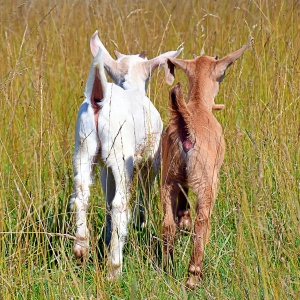
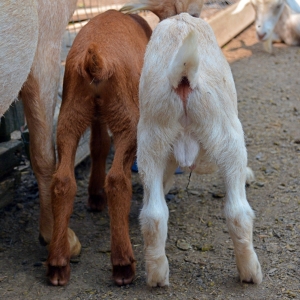
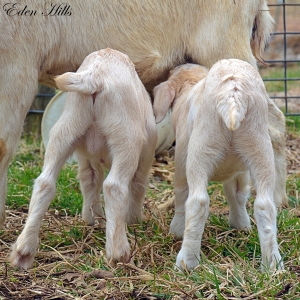


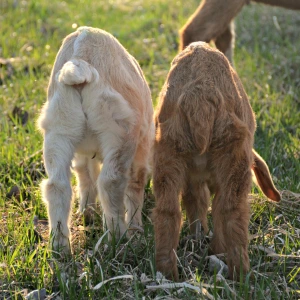

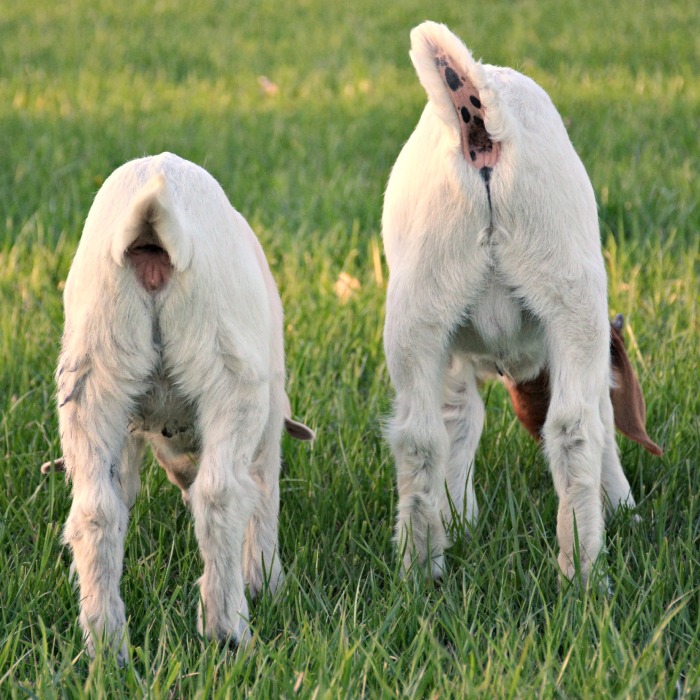

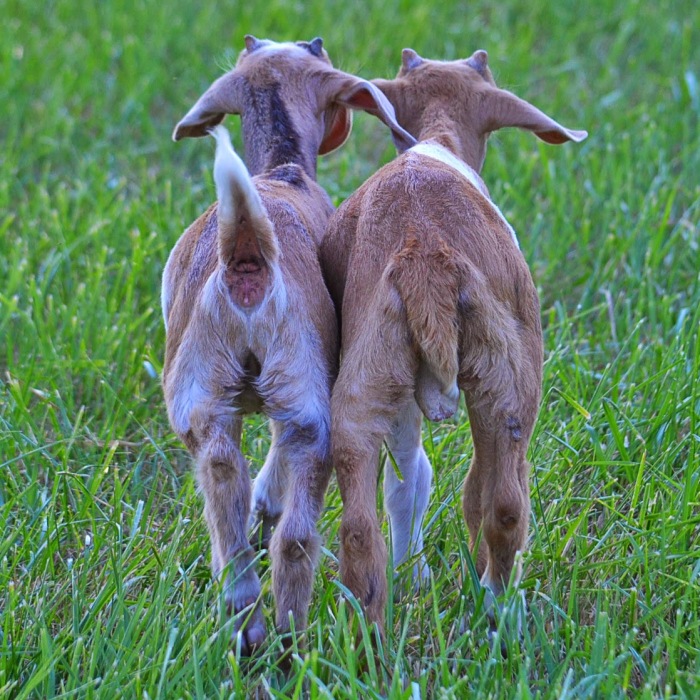





sounds very scary. i do hope you don’t have any other problems…
It’s scary how many horrible illnesses there are out there that effect goats. 😦
Oh, crap…
That’s about my initial reaction. 🙂
I’m sorry!
Thanks. It’s been a long week since I got the call from the vet.
Where is the “do not like” and “make this go away” button? I hate that you got that result Teresa. I’ve been thinking of you since I heard.
Thanks. It was really hard at first, but I obviously am not surprised since I requested the test. Now I’m all about moving forward. 🙂
I hope the rest of your goats escape this illness.
I already see signs in some of the other goats, so this is something I will continue to deal with. Thanks for your good wishes.
Wow! You always seem to stay on top of health of your goats. Please keep us posted as you go forward. I wish for you a time of quietness.
Thank you. I’m pretty sure my goats will not stop until I know absolutely everything there is to know about goats. It seems to be their mission. 🙂 I will certainly keep updating how they are doing.
I’m sorry, Teresa. I hope that you don’t lose any more goats.
Thank you. It’s inevitable. It’s just a matter of how to provide them more quality time. 🙂
We are sorry. Iowa definitely needs one of those angels about now. Or two or three. Hugs to you!
You know, this has really been a horrible start to 2013, but I’m actually doing much better with all this than I should be. I would guess it’s from all your wonderful angels and supportive blogging friends. Thanks so much.
Interesting, but sad 😦 My sister has goats and sheep (mostly sheep) and it never ceases to amaze me what seemingly “new” (to us) maladies crop up among them. I adore goats and sheep, but don’t think I’m tough enough to handle it! Bless you and your herd. They are beautiful! -Tammy
Thank you. It’s certainly a good thing I knew nothing when I got my first goats. If I’d known all the horrible things that they are susceptible to, I wouldn’t have had the courage to raise them. I do love them though!
Wow. I have a single goat (she has a pot-bellied pig as a companion – he thinks he’s a goat, too.) She came to me by accident, by luck, and I’m not very versed in goat health. This is scary. Cutie was beautiful. I’m so sorry this happened to her.
I don’t want to scare you, so be sure to stop back and read my thoughts on coping with CAE in the herd.
Bless your heart. I cannot imagine the pain you must be having to endure in just thinking about watching your beloved goats suffer. I know you love them the way other love their dog or cat…and look how many of them you have to love! That pain would be multiplied that many times. I don’t know how in the world you will deal with it, but remember that God doesn’t give us more than we can bear. Maybe your goats being infected with this virus will spread the word through your blog ….and maybe even other means….and others will take precautions because of what you had to go through. Hugs. I know you will give them the best care you can.
Thank you so much for your kind words. I am honestly much better with this than I probably should be. I’ll be explaining my thoughts on living with CAE in the herd in another post soon.
How very sad. Have you got the space/facilities to separate out the infected animals?
I will be doing a post on how I will deal with it soon as it is probably all of my goats are infected.
Sigh….the ongoing battle to love a goat……….
*hugs*
The loving them is the easy part! 🙂
Viruses are strange and fascinating things – but I think we could do without most of them! Hope the rest of the herd does OK.
Cheers – Stewart M – Melbourne
Thanks. We’ll get through this one way or another. 🙂
What a terrible thing for an animal to have to go through. Thanks for the info.
It really is scary all the different illnesses out there.
I have so many questions…but I’ll wait for your post explaining living with CAE on the farm…I have no doubt that it’ll answer most of what I want to ask. 😉
Other than that, all I can say is damn. I’m sorry that you have to deal with this. (((Teresa)))
Thanks. I swear these girls are just determined to make me an expert on goat health. 🙂
Do hope your ‘herd’ is all fine ~ Most informative post and as always i love your photography of you sweet animals ~ so well done ~ Happy Week to you ^_^
(A Creative Harbor) ^_^
Thanks. I do try to share the information I learn from having my herd. I just wish it was always happy information!
So sorry to hear what you are going through at the moment. I hope there will be ebtter news soon.
Thanks. It seems like there is always something to deal with when you farm.
I’m sorry to hear about Cutie. Will you be testing everyone else?
I have two positive does in my herd. They were from a clean “herd”, which is the irony. My one who is negative was from someone’s backyard. I was very upset when I learned of it, but I have learned to live with it. I love my girls. Their disease changes nothing. I will keep them in the best health that I can, and make sure that they have all that they need, and I am determined to enjoy them while I can.
I would like to tell you that I have done a lot of research on the disease since learning about my girls’ status, and there’s a lot of disagreement on how easily it’s transmitted. For all the people who say it’s transmitted by breeding, there are the same number of people who say it’s not. For all those who say that it’s transmitted by saliva, there are the same number who say it’s not. THere is a lot still to be learned about it, I think. Keep your chin up, and if you need anyone to talk to, my door is open!
So sorry to hear about your girls. I have the same attitude as you. Their illness changes nothing. I will simply assume they are all positive rather than testing another 44 goats. I do see signs in some of the older ones, and pretty much all of my herd is descended from them. In a few years, I’ll decided how to move forward when I would need to replace some of my breeding stock. I might test then.
I have a male adult goat as pet .He osbfacing problem in standing up after sitting due to pain in front legs.
He is not eating much amd grinnding teeth yawning and stretching body.Plz help me I love him more than anyone in this world .
Call a vet. The grinding teeth is an indication of pain. They can give you a diagnosis and help manage the pain.
I have a male adult goat as pet .He is facing problem in standing up after sitting due to pain in front legs.
He is not eating much amd grinding teeth yawning and stretching body.Plz help me I love him more than anyone in this world .